Positions & Papers
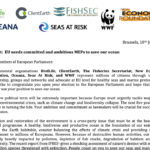
Joint NGO letter to new Parliament: “EU needs committed and ambitious MEPs to save our ocean”
July 15, 2019
In a letter to newly elected MEPs serving in the European Parliament for the next five years, environmental organisations BirdLife, ClientEarth, The Fisheries Secretariat, New Economics Foundation, Oceana, Seas At Risk, and WWF called on politicians to deliver on 8 concrete EU commitments that protect marine life, habitats and biodiversity. The letter highlights that "the EU already has the laws, obligations and commitments. Now we call on you to move from words to actions. We count on your determination in this challenge."
These commitments include "4. Fully implement the Common Fisheries Policy. 5. Eliminate Illegal, unreported and unregulated fishing, and strengthen fisheries control and enforcement; introduce fully documented fisheries. 6. Save the Mediterranean - the most overfished sea of the world - by reducing the excessive fishing effort, minimizing fishing impacts on vulnerable species and habitats and substantially improving the culture of compliance in the region."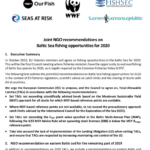
Joint NGO recommendations on Baltic Sea fishing opportunities for 2020
June 10, 2019
- Set TACs not exceeding scientifically advised levels based on the Maximum Sustainable Yield(MSY) approach for all stocks for which MSY-based reference points are available.
- Where MSY-based reference points are not available, to not exceed the precautionary approach catch limits advised by the International Council for the Exploration of the Sea (ICES).
- Set TACs not exceeding the FMSY point value specified in the Baltic Multi-Annual Plan (MAP), following the ICES MSY Advice Rule when spawning stock biomass (SBB) is below the MSY Btrigger reference point.
- Take into account the lack of implementation of the Landing Obligation (LO) when setting TACs, and ensure that TACs are respected by increasing monitoring and control of the LO.
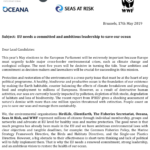
Joint NGO letter to European Parliament lead candidates
May 17, 2019
The environmental organisations BirdLife, ClientEarth, The Fisheries Secretariat, Oceana, Seas At Risk, and WWF are calling on the newly elected members of the European parliament to take “committed and ambitious leadership to save our ocean”. In a joint NGO letter to MEP lead candidates to the European Parliament elections on 23-26 May 2019, NGOs highlighted the need for the European Union to provide committed and ambitious leadership to save our ocean. Referring to commitments made under the UN Sustainable Development Goals, Common Fisheries Policy, Marine Strategy Framework Directive, EU biodiversity strategy and Birds & Habitats Directive we call on the EU to implement the laws and obligations to which it is committed. NGOs urge the fulfillment of eight crucial actions over the next five years in order to ensure the future of European seas and our collective future is protected. The European Green party replied stating "The European Green Party is glad to inform you that the Green Lead Candidates, Ska Keller and Bas Eikchout, commit on the crucial actions that you mention in your letter." The European People's Party replied saying "Combatting climate change and defending our environment are fundamental for our future. This is why fighting climate change is one of our election priorities....We would like to express our support for your work in defending our nature and oceans."
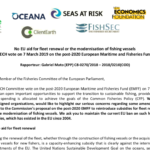
Joint NGO letter to MEPs on the reintroduction of harmful subsidies for fleet renewal and vessel modernisation
February 27, 2019
This joint NGO letter highlights our serious concerns regarding some amendments tabled to the European Commission’s proposal on the post-2020 European Maritime and Fisheries Fund to reintroduce subsidies for fleet renewal and the modernisation of fishing vessels. We ask MEPs to maintain the current EU ban on such harmful subsidies, which has existed in the EU since 2004. Funding the renewal of the fleet, whether through the construction of fishing vessels or the acquisition of fishing vessels for new fishers, is a capacity-enhancing subsidy that is clearly against the international commitments of the EU. The United Nations Sustainable Development Goal on the oceans, seas and marine resources (SDG 14) explicitly calls for the elimination of harmful fisheries subsidies that contribute to overcapacity and overfishing by 2020. The EU phased out aid for the construction of new vessels over a decade ago and is actively advocating for the prohibition of fisheries subsidies that contribute to overcapacity and overfishing during negotiations in the World Trade Organization (WTO). Proposing amendments to re-introduce these types of subsidies undermines the objectives of the CFP to end overfishing, jeopardises the EU position in the ongoing negotiations over fisheries subsidies at the WTO, and sends the wrong political signal from the EU to political leaders around the world.
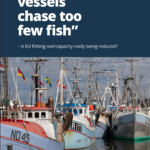
Too many vessels chase too few fish – report on overcapacity in the EU
December 4, 2018
A new report from the Fisheries Secretariat shows that EU rules regarding fishing capacity are not being followed in the Baltic region. Member States have fudged their figures, obscuring which fleet segments and vessels fish on which stocks and the European Commission has not revised its guidelines in order to ensure clarity, as recommended by its own advisory committee. There is clear evidence that overcapacity has been used to influence quota negotiations at the EU Council, however, despite EU subsidy funding being based on there being no overcapacity the Commission has not taken action to follow through. Article 22 of the EU Common Fisheries Policy requires Member States to adjust the fishing capacity of its fleet to the available fishing opportunities. Overcapacity should be identified and addressed, in order to achieve a better balance with the harvested stocks, avoid overfishing, reduce incentives for discarding and other illegal practices, and avoid the socioeconomic problems caused by too many vessels competing over limited quotas. However, the system put in place to address overcapacity in 2013 fails at just about every step, according to the report. You can read our news story on the report here We have also produced national summaries for Denmark, Germany and Poland.
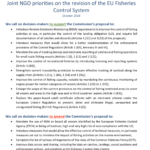
Joint NGO priorities on the revision of the EU Fisheries Control System
October 30, 2018
A broad coalition of NGOs have together drawn up a series of recommendations based on the EU Commission proposal for the revision of the Fisheries Control System, this includes both an analysis of the proposal as well as a detailed 12 point plan for reform. In November 2019 our Joint NGO priorities have been updated.
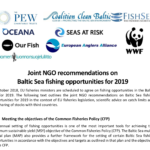
Joint NGO position on Baltic TACs and quotas in 2019
August 1, 2018
This briefing provides joint recommendations from nine organisations on fishing opportunities in the Baltic for 2019. We highlight the priorities of full implementation of the maxiumum sustainable yield objective and the landing obligation, urging Ministers to set quotas not exceeding scientific recommendations.
The Fisheries Council will conclude negotiations on the TACs on 15-16 October in Brussels and the regional management forum, BALTFISH, will conduct preparatory work.
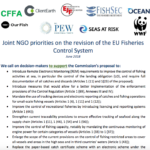
EU Fisheries Control System revision – joint NGO priorities
June 26, 2018
The Commission proposal for a revision of the 2010 EU fisheries Control Regulation has been published and a coalition of NGOs have outlined our priorities here. These include ensuring full compliance with the landing obligation, achieving coherence with Technical Measures, improving enforcement and sanctions, making better use of technology to improve the accuracy of reporting and allow for better data, improving traceability, as well as ensuring MPAs are guaranteed effective protection.
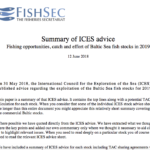
Summary of ICES advice on Baltic stocks for 2019
June 12, 2018
On 31 May 2018, the International Council for the Exploration of the Sea (ICES) Advisory Committee published their advice regarding the exploitation of the Baltic Sea fish stocks for 2019. Here we provide a summary and comment on the assessments and advice.
A table with the summary of the ICES advice can be found here.
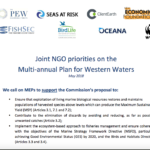
Western Waters management plan and BMAP revision – NGO recommendations
June 5, 2018
In this paper we provide joint recommendations for the management plan proposals.